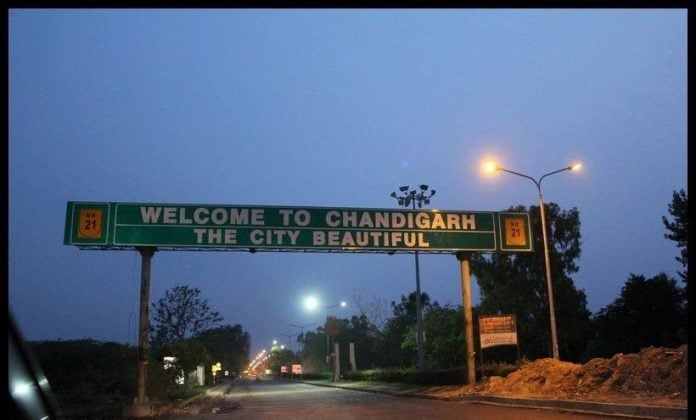It is been a long simmering dispute that is once again creating a political slugfest. The latest development was when the new Chief Minister of Punjab and Leader of the state assembly, Bhagwant Mann, moved a resolution in the state assembly, urging the centre to transfer Chandigarh to Punjab. The House also implored the central government to honour the principles of federalism enshrined in the Constitution and not take any step which may disturb the balance in the administration of Chandigarh and that of other common assets like Bhakra Beas Management Board.
Predictably, BJP MLA Ashwani Sharma vehemently opposed the resolution and walked out of the state assembly in protest. The resolution was moved during a one-day special sitting of the first session of the 16th Punjab assembly. Mann said that his government would exploit all channels by seeking an appointment with the prime minister and the Union home minister to mount pressure on the central government in order to take their fight for legitimate rights of Punjab to its logical end.
Chandigarh was planned to replace Lahore, the capital of erstwhile Punjab, which became part of Pakistan during the Partition. At the time of reorganisation of Punjab in 1966, the city assumed the unique distinction of being the capital of both Punjab and Haryana, even as it was declared a Union Territory and placed under the direct control of the centre. This is not the first time that Punjab has demanded that Chandigarh be handed back to the state.
Mann exhorted all the MPs and MLAs from the state to exhibit the same spirit of unity as often demonstrated by the leaders of the southern states to safeguard the rights of their respective states. Lambasting the BJP-led central government, Mann said that its leadership was bent upon indulging in vendetta politics in general, and especially in states like Punjab, Delhi and West Bengal where it has failed to get the people’s mandate. He also assailed the centre for usurping the powers vested in the states, thus tinkering with the federal structure to pursue political interests.
Following the adoption of the resolution by the Punjab assembly, Haryana also convened a special session of the Vidhan Sabha on April 5 where Chief Minister Manohar Lal Khattar condemned the Punjab assembly’s resolution seeking the transfer Chandigarh to the state.
“It is condemnable. They (Punjab) should not have done this,” Khattar told the media. “If they want to do something like this, they should first go to the Supreme Court over resolving the Satluj Yamuna Link Canal (SYL) issue. The Hindi-speaking areas were not given to Haryana, which delayed the rest of the issues. They should say that they are ready to give Hindi-speaking areas to Haryana,” said Khattar, adding that Chandigarh is and will remain the capital of both states.
He added that Punjab, Haryana, Himachal Pradesh and Chandigarh came into existence through the Punjab Reorganization Act passed in 1966. “There is a provision in this Act that 60 per cent of employees of Chandigarh will be from Punjab and 40 per cent will be from Haryana. Since that time, Chandigarh has been the capital of Haryana and Punjab,” he said. The chief minister said not only Punjab and Haryana, but the people of Himachal Pradesh should also ask for their share in Chandigarh.
On April 5, the Haryana assembly passed a resolution seeking the completion of the SYL canal and the transfer of Hindi-speaking areas from Punjab. “This House notes with concern the resolution passed in the Legislative Assembly of Punjab on 1 April, 2022, recommending that the matter for transfer of Chandigarh to Punjab be taken up with the Central government,” the Haryana resolution said. “This is not acceptable to the people of Haryana,” it said, adding that Haryana continued to retain its right to the joint capital of the two states. The resolution, moved by Khattar, was adopted unanimously after a three-hour debate. It was backed across party lines in Haryana.
Participating in the discussion, former Haryana chief minister and Leader of the Opposition in the state assembly, Bhupinder Singh Hooda, slammed the resolution passed by the Punjab assembly. “The Punjab resolution has no meaning, it is only a political gimmick,” he said. The resolution urged the centre not to take any steps that would disturb the “existing balance” till all issues between the two states are settled.
Punjab’s latest claim has opened a Pandora’s Box, with the issue of SYL construction and the surface water dispute between Delhi and Haryana—over which the two states have been at loggerheads every summer—resurfacing. Hooda said that the Haryana government must raise the SYL water issue and stop helping Delhi with additional water in summer. The SYL, the sole source of surface water for the national capital, belongs to Haryana as it has completed 90% of its construction— unlike Punjab—and the state is sharing surface water with Delhi according to the directions of the Supreme Court to supply 600 cusecs of water. However, the Haryana government has been supplying 1,000 to 1,200 cusecs of water to help the people in Delhi during summer.
Resolutions regarding Chandigarh were passed in the Punjab assembly earlier too, but this time the political scenario has changed in Punjab. Predominantly a Congress bastion, the state has shifted to Aam Aadmi Party (AAP), which has also been in power for over seven years in Delhi. Curiously, AAP chief and Delhi Chief Minister Arvind Kejriwal is from Haryana. With AAP flexing its political muscle, the issue over Chandigarh could cause a political heat wave.
—By Abhilash Singh and India Legal Bureau


